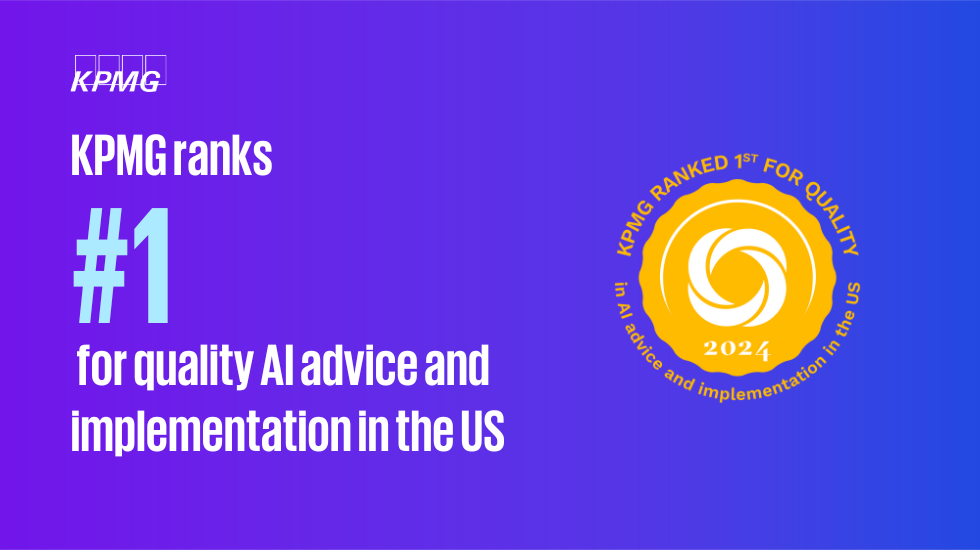Footnotes
i KPMG AI Quarterly Pulse Survey, January 2025.
ii KPMG AI Quarterly Pulse Survey, October 2024.
How to think about ROI across both short- and long-term bets

Have you thought about how to quantify the value of your AI investments? You should. The majority of respondents feel that AI will fundamentally change the nature of their business over the one-to-two-year horizon (56% in the next year and 67% in the next two years).i And yet, a recent KPMG poll shows that, to date, only 15 percent of business leaders have established formal metrics for measuring AI returns.
The way in which companies define and measure ROI spans a broad spectrum. Some businesses are dabbling in AI with no clear expectation of immediate returns. Although not ideal, this is, of course, preferable to not entering the AI arena at all. More common are companies making short-term, incremental changes that result in improved quality and boosts to creativity. Finally, those companies that are pursuing full-scale, enterprise-wide AI implementations require more quantifiable ways to gauge long-term profitability.
Fifty-one percent of companies recently surveyed by KPMG say revenue generation is their top ROI metric, followed by profitability (38%) and productivity (36%).ii Since 68% of leaders will invest between $50-$250 million in GenAI over the next 12 months, up from 45% in Q1 of 2024,i the focus on revenue will become not just increasingly critical, but likely the most urgent and high-stakes C-suite conversation in 2025.
Half of leaders are currently scaling their GenAI technology, up from 10% six months ago. However, only a third (31%) of leaders anticipate being able to measure ROI in the next six months, and as of today, none believe they have reached that stage in their GenAI implementation.i
AI enablement in the back office: Artificial intelligence (AI) is transforming back-office functions, offering substantial value by driving operational efficiencies. By implementing AI to speed up repetitive and time-consuming tasks - such as data entry, transaction processing, and compliance checks - organizations can redirect employee efforts to more strategic value-driving activities. AI’s ability to process and analyze large volumes of data much faster than human teams can be of particular value in functions like finance. Further, the technology’s ability to automate processes and streamline software development is universally applicable in IT departments.
In IT, organizations also can scale their use of GenAI to their software developers to accelerate the pace of software development, onboard new developers faster, and enable more efficient troubleshooting. For example, AI-driven coding assistance tools can suggest code optimizations and corrections, significantly speeding up the software development process and reducing errors.
Organizations should consider that, in finance, the number of potential AI use cases can, in total, amount to full finance department transformations. Applications ripe for AI enablement include financial reporting; complex scenario forecasting, predicting and adjusting pricing based on market analysis; optimizing invoice management; detecting anomalies and fraud; and creating recurring materials for financial close, operations and business reviews.
AI enablement in the front office: By integrating AI, organizations can offer more tailored experiences that can significantly boost satisfaction and loyalty. AI's data analysis capabilities allow companies to deliver solutions that are not only responsive to customer needs but also help anticipate and address those needs before they become pain points.
In marketing, sales, and communications, AI is yielding increased revenues by uncovering a deeper understanding and prediction of customer preferences and behaviors, which enable personalized interactions. AI-driven platforms are being used to automate routine communications, generate short- and long-form content, optimize SEO, and amplify companies’ brands in the market with extreme agility and speed. Embedding AI capabilities into existing products and services helps organizations introduce new, innovative offerings that meet evolving customer expectations.
While early use cases have rightfully centered on customer-facing applications and quick-win productivity gains, there is significant untapped potential in what we call the “middle office” in knowledge-worker-centric industries. Deploying AI knowledge assistants or enhancing customer experiences through targeted AI capabilities deliver measurable business benefits and are likely to achieve strong adoption within organizations.
Embracing the future
To gain executive buy-in, the time has come for organizations to pay attention to driving, predicting, and measuring returns on AI investments. This is true whether quantifying the value of short-term wins or gauging long-term profitability impacts of transformational AI initiatives. It is likely that the most successful businesses in our future will be enabled by AI. Those companies will stand out not for one-off innovative use cases, but for the infusion of AI across functions, at all levels, and throughout the enterprise.

As technology leader HP was embarking on major acquisitions, the company wanted to streamline the complex deal process and eliminate surprises. KPMG led the development of a technology-first platform that has empowered HP’s team to optimize core M&A activities via a new suite of tools including predictive models, automations, AI and GenAI applications, and real-time data. The platform is turbocharged by more than 50 AI-enabled automations that streamline such process-heavy tasks as data collection and reconciliation, integration management reports and workflow tracking, and critical budget drivers like inventory transfers and trading structure requirements.
This solution has enabled HP to significantly accelerate the complex integrations of recent acquisitions, realize synergies, and achieve deal value. The solution has delivered millions of dollars in efficiency gains to date and is expected to generate additional returns as the platform is leveraged for ongoing M&A activities.
i KPMG AI Quarterly Pulse Survey, January 2025.
ii KPMG AI Quarterly Pulse Survey, October 2024.
Harness the full power of GenAI with AI-enabled solutions to advance your capabilities, accelerate growth and value, increase efficiencies, and sustain a competitive advantage.
Explore our latest thinking on how to realize the many benefits of integrating AI across your enterprise.

Accelerating revenue in the age of Generative AI
Explore GenAI’s impact on revenue-generating teams from boosting productivity and improving experiences to reducing cost of sales.

Accelerating generative AI success by activating change
The biggest risk with adoption may not be what you think.

Leading Digital Transformation at KPMG with Trusted AI
How KPMG is leading AI-driven digital transformation, focusing on ethical AI use and enhancing client services.

KPMG Ranks #1 for Quality in AI Advice and Implementation by Source
According to senior buyers of consulting services who participated in the Source study, Perceptions of Consulting in the US in 2024, KPMG ranked No. 1 for quality in AI advice and implementation services.

Enable your organization with KPMG AI Workforce
KPMG AI Workforce helps organizations capture the value of their investments by optimizing their workforce and prioritizing their people.
